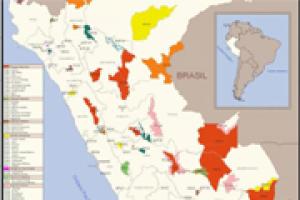The Peruvian government is not only responsible for the open repression of Amazonian peoples which it is currently carrying out, but also for the silent genocide of the last uncontacted indigenous groups still living in isolation within their ancestral territories.
Peru
Bulletin articles
29 June 2009
Bulletin articles
30 May 2009
Since 9 April, the communities of the Peruvian Amazon have started what they have called an “indefinite strike” all over the Peruvian Amazon, in response to the failure of the Congress of the Republic to repeal six decrees considered prejudicial to the indigenous peoples.
Bulletin articles
24 July 2008
This past 8-10 July, the Peasant Confederation of Peru and the National Agrarian Confederation, with the wide backing of a large number of indigenous and peasant organizations, carried out a country-wide protest which coincided on July 9 with a national general strike called by the General Confederation of Workers of Peru (CGTP).
Other information
26 June 2008
In late May, aerial photos taken during a fly-over piloted by the coordinator of the Ethno-Environmental Front of FUNAI (the National Indigenous Foundation of Brazil) confirmed the existence of indigenous people living in voluntary isolation on the border between the Brazilian state of Acre and Peru. They are members of one of four indigenous ethnic groups living in isolation in this area.
Other information
28 April 2008
Alan Garcia’s government is promoting a bill (draft law 840) also known as the “Forest Law.” It is a law concerning the promotion of private investment in reforestation and agro-forestry, whereby land with no forest cover in the Peruvian Amazon – erroneously classed as deforested wastelands, meaning there are no acquired rights over them – could be allocated, not as concessions, but as private property. This would open the door to major capital to establish large-scale tree plantations, under the guise of “reforestation.”
Bulletin articles
3 January 2008
At the end of 2007, the Peruvian government opened the way to the exploitation of new oil plots in the Province of Loreto, on the frontier with Ecuador: plots 67 and 121 to the US Barrett Resources Corporation and plot 39 to the Spanish company Repsol YPF.
Bulletin articles
16 October 2007
Between 8 and 13 October, fisher-folk organizations, artisanal gatherers, environmentalists and academics from 10 Latin American counties organized in Redmanglar International, met in the locality of Cuyutlan, State of Colima, Mexico.
During a whole week of work, it was reported that a policy for appropriation and use of coastal and marine spaces is being reaffirmed and strengthened worldwide, placing the economic interests of a few before ecosystem conservation sustaining the life and fundamental rights of local communities.
Other information
26 September 2007
Only available in Spanish -
Nota que da cuenta de la indudable existencia de grúpos indígenas nómadas en aislamiento voluntario en la Amazonía sur oriental del Perú - Intendencia de Áreas Naturales Protegidas, Lima, setiembre 2007
Descargar como pdf
Other information
29 December 2006
Peru is one of the few South American countries where large scale monoculture tree plantations have not yet been introduced; however the government is seeking to promote their expansion. In fact the country already has a “2005-2024 National Reforestation Plan” [National Plan] and also a “Law for the promotion of private investment in afforestation and/or reforestation” [Forestation Law], the basic tools to make tree plantations justifiable and feasible.
Other information
30 September 2006
In our previous issue (WRM bulletin 109) we made reference to the promotion of oil palm plantations, denouncing their negative impacts on the Amazon forest and on displaced peasants.
The wave of plantations continues, with other types of alien trees. In July of this year the National Reforestation Plan was submitted, promoting plantations for commercial and industrial purposes. Adopted in January 2006, the plan set out an average annual rate of plantation of 104,500 hectares from now until the year 2024.
Other information
1 August 2006
Oil palm plantations are expanding in South America: Colombia, Ecuador, Venezuela and now Peru have joined the commercial thrust. The companies find profitable opportunities at the expense of the invaluable Amazon forest and of the lives of peasants who are displaced from their lands where they obtain their means of livelihood.
Bulletin articles
7 March 2006
At a cost of 1,600 million dollars, the Camisea mega project for natural gas extraction from an area located on the banks of the Camisea River -one of the world’s richest areas in biodiversity- has the Inter-American Development Bank as its main public financer. However, it has not brought any benefit to the local communities. As denounced in WRM Bulletin No. 95, the Camisea project will be carried out at the expense of forest destruction, river contamination and noise pollution, soil erosion and the consequent degradation of flora and fauna in the project’s area of influence.

